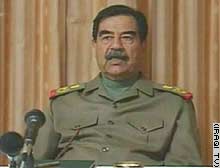January 02, 2007
Revisiting the First War
He's hardly the first to point this out, but Robert Fisk says that now that Saddam Hussein's been executed, he can no longer expose the West's role in propping him up—or explain how the United States sold Iraq the chemicals he would later use to gas the Kurds in Halabja. Or tell a million other rather inconvenient tales.
 That's certainly true, although if we're talking about secrets that Saddam will now take to his grave, I've always been interested in his meeting with April Glaspie, the U.S. ambassador to Iraq under the first Bush administration, which took place on July 25, 1990, a month before Iraq's invasion of Kuwait. By some accounts, it sure seems like Glaspie basically implied that the U.S. would stay neutral in the event of war. "We have no opinion on your Arab-Arab conflicts, such as your dispute with Kuwait," reads one version of the transcript of the meeting.
That's certainly true, although if we're talking about secrets that Saddam will now take to his grave, I've always been interested in his meeting with April Glaspie, the U.S. ambassador to Iraq under the first Bush administration, which took place on July 25, 1990, a month before Iraq's invasion of Kuwait. By some accounts, it sure seems like Glaspie basically implied that the U.S. would stay neutral in the event of war. "We have no opinion on your Arab-Arab conflicts, such as your dispute with Kuwait," reads one version of the transcript of the meeting.In retrospect, the first Gulf War against Iraq has always been the "no-brainer" war—the war all right-thinking people agree was perfectly justified. Or so goes the conventional wisdom. But it's entirely possible that the first Bush administration might have prevented the whole war in the first place by warning Saddam in no uncertain terms that an invasion of Kuwait wouldn't be tolerated. Then again, James Akins, the Saudi ambassador at the time, told PBS that no diplomat in Glaspie's position would have ever threatened war. And in a later interview, Joe Wilson insisted that Saddam "did not think he was getting a green or a yellow light."
So maybe Kenneth Pollack's right and the invasion of Kuwait was a wholly irrational act that couldn't have been deterred. (And perhaps world history would've taken a turn for the worse had there been no Gulf War and Iraq developed nuclear weapons.) Still, it would have been valuable to at least try and get a fuller picture of this story from Saddam himself. I suppose people could still ask Tariq Aziz, since he was at the April 25 meeting too, and he hasn't been executed yet.
